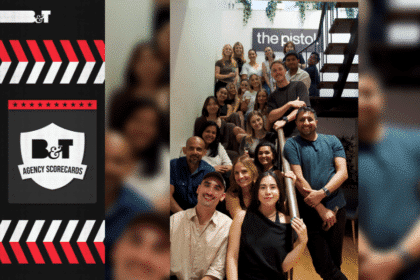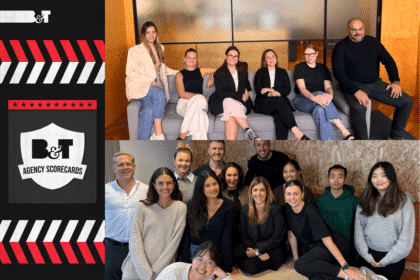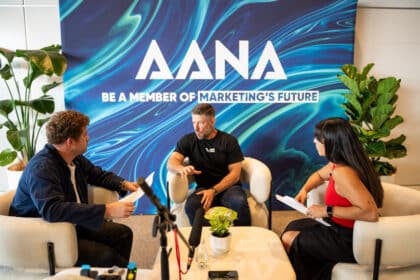M&C Saatchi Group’s media agency, Bohemia, has turned around its fortunes since Paul ‘Hutch’ Hutchison took the helm 18 months ago. In 2023, the agency won a slew of new business, rolled out a new market proposition and improved employee engagement. Hutch caught up with B&T to explain the next steps in his three-year transformation strategy and what the industry needs to do to remain relevant.
Bohemia’s stock has risen since Paul Hutchison took over the M&C Saatchi owned media agency in late 2022.
In his first year at the helm, Hutch – as is commonly known in agency circles – rolled out a new market proposition, took it on a roadshow and set about fixing some of the cultural issues that had set in when the agency had a leadership vacuum prior to his appointment.
Bohemia needed a refresh; it had once been one of the darlings of the indy world, growing rapidly under Hutch’s predecessor and founder Brett Dawson – picking up clients including Vodafone, Caltex and Lion – but soon realising that it had grown too quickly and was unable to handle the work.
Hutchison arrived in Australia having led large British agencies including Wavemaker, MEC and Vizeum.
One of his first tasks was to assess the market and how Bohemia was being viewed internally and externally, before introducing a new proposition last year to ‘move people through handcrafted memorable media’.
Although that might sound like a word salad to some, essentially it means moving audiences emotionally in their attitudes towards brands, and through the purchase journey by investing in performance data and acquisition smarts.
‘On a roll’
In 2023, the new proposition appeared to gain traction on the pitching circuit; Bohemia went for 10 reviews and won seven; which is an impressive strike rate in a challenging environment.
Wins included the Australian Retirement Trust (a multi-million media billings account), multinational energy management company Schneider Electric and New Zealand’s largest retirement living provider Ryman Healthcare.
The agency also recorded its “highest ever” TRR (The Referral Rating) score of 8.2 out of 10, which measures client satisfaction levels.
Bohemia, which has around 40 staff, grew headcount by around 5 per cent in the past year, and has improved employee engagement scores to its highest level in years.
“We have momentum,” Hutchison said. “Last year, we spent quite a lot of time looking out at the industry trying to raise our profile, and looking inwardly at us and making sure that we’re organised, correctly motivated and engaged as a team.
“This year is very much about the work and looking after our clients. It’s about putting everything we’ve promised into practice for our clients. When you have a proposition like ours, it lives and breathes in the work we put out into the world. Initially, we have been very good at describing the challenges we face, and now we want to be better at solving them for clients.”
Examples of this include how to evolve media plans and strategies as consumers shift away from linear TV to a multitude of devices and platforms.
“I don’t know a single client that isn’t thinking about how to reach large audiences quickly, because we can no longer easily do it through free to air TV spots and know that in a week, we’ve reached 50 per cent of the population. So mass scale reach is something that clients are talking about,” Hutchison said.
Another is digital transformation, which has been really prominent in our conversations with clients.”
Breaking down silos
Hutchison said that Bohemia is benefiting by being able to tap into complimentary services offered across the M&C Saatchi Group.
This year, 50 per cent of the pitches Bohemia has been involved in are consolidated plays with other parts of M&C Saatchi.
“In the first six months that I was here, we placed a lot of focus on making sure the media product could stand alongside some of the other capabilities in the group, where that is advertising, brand experience or even data and tech consulting,” he said.
“We see more clients are interested in a consolidated offering, but what they will not accept is that we are not exceptional at all of these services, so while integrated teams are important, it’s not at the expense of deep specialism in whatever we do.”
Although Hutch cannot see the industry return to full service agency models of yesteryear, he believes that agencies need to evolve their service offering and the way they work across paid, earned and owned media to stay relevant in the future. This includes becoming more sophisticated in data, tech, retail media and broader digital transformation.
“There are a lot of trends that are challenging the agency business model, such as client in-housing and consultancies entering areas that have historically been dominated by agencies,” he said.
“If we want to be relevant in three years’ time, we need to be seen as an investment that is going to help clients high future growth, and be really clear about our role. We want to be a growth partner, not just a media buyer or someone that produces their advertising.”








